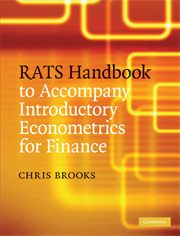Book contents
- Frontmatter
- Contents
- List of figures
- List of screenshots
- Preface
- 1 Introduction
- 2 The classical linear regression model
- 3 Further development and analysis of the classical linear regression model
- 4 Diagnostic testing
- 5 Formulating and estimating ARMA models
- 6 Multivariate models
- 7 Modelling long-run relationships
- 8 Modelling volatility and correlation
- 9 Switching models
- 10 Panel data
- 11 Limited dependent variable models
- 12 Simulation methods
- Appendix: sources of data in this book
- References
- Index
12 - Simulation methods
Published online by Cambridge University Press: 05 June 2012
- Frontmatter
- Contents
- List of figures
- List of screenshots
- Preface
- 1 Introduction
- 2 The classical linear regression model
- 3 Further development and analysis of the classical linear regression model
- 4 Diagnostic testing
- 5 Formulating and estimating ARMA models
- 6 Multivariate models
- 7 Modelling long-run relationships
- 8 Modelling volatility and correlation
- 9 Switching models
- 10 Panel data
- 11 Limited dependent variable models
- 12 Simulation methods
- Appendix: sources of data in this book
- References
- Index
Summary
Simulation studies are often used in econometrics when the properties of a particular estimation method are not known. For example, it may be known from asymptotic theory how a particular test behaves with an infinite sample size, but how will the test behave if only 50 observations are available? Will the test still have the desirable properties of being correctly sized and having high power? In other words, if the null hypothesis is correct, will the test lead to rejection of the null 5% of the time if a 5% rejection region is used? And if the null is incorrect, will it be rejected a high proportion of the time?
The way that such a study would be conducted (with additional steps and modifications where necessary) is as follows.
Generate the data according to the desired data-generating process (DGP), with the errors being drawn from some given distribution.
Run the regression and calculate the test statistic.
Save the test statistic or whatever parameter is of interest.
Go back to stage 1 and repeat N times.
A brief explanation of each of these steps is in order. The first stage involves specifying the model that will be used to generate the data. This may be a pure time-series or a structural model. Pure time-series models are usually simpler to implement, as a full structural model would require the researcher to specify a data-generating process for the explanatory variables as well.
Information
- Type
- Chapter
- Information
- RATS Handbook to Accompany Introductory Econometrics for Finance , pp. 175 - 193Publisher: Cambridge University PressPrint publication year: 2008
